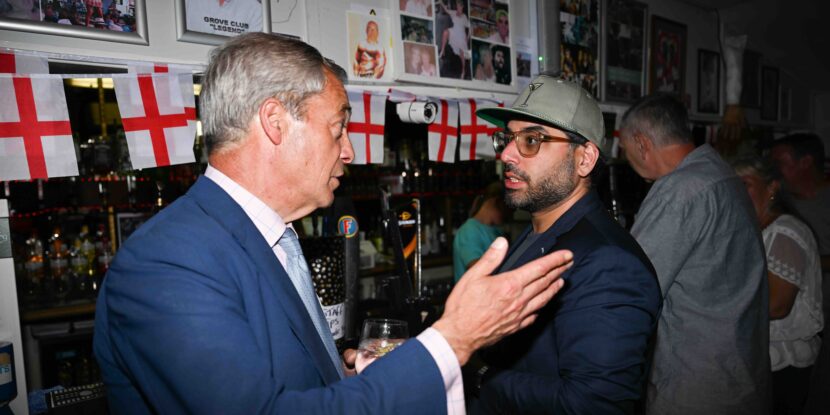CLACTON, England — Nigel Farage is now a grandfather, with the child being born on June 23, 2024. The eighth anniversary of the 2016 Brexit referendum, to the day. What are the odds?
The now-Brexit grandaddy has had a heck of a week for achievement, winning his third consecutive broadcaster of the year award in the UK on Tuesday before landing back in the parliamentary constituency of Clacton to watch the England football (soccer) match at the Three Jays pub in the deprived Jaywick neighborhood. England haven’t had as illustrious a week as Farage, and both face bumps in the road as they enter the final stages of their respective campaigns.
For England, the problem revolves around cautious tactics, a team of individuals, and the possibility of being knocked out of the Euro 2020 tournament by a small team next week.
Complicacies for Farage’s Reform Party arise from scant resourcing, time scarcity, and good old-fashioned establishment cheating.
The prospect of local political chicanery looms large: a potential Labour-Conservative voting alliance against him, as well as a fairly noisy independent candidate who used to represent Reform in the district—Tony Mack—looking to spoil Farage’s electoral hopes.
If the campaign’s canvassing numbers are correct, the seat looks pretty good for Farage. But a few hundred votes in Jaywick, a few hundred Conservative Party voters reverting to type, and a few hundred Labour supporters voting tactically could be enough to keep him out of Parliament.

It’s why, despite having so many appointments across the country, Farage flies back to Clacton multiple times a week. To press the flesh, see and be seen, and hammer the message home. His staff almost all agree: this campaign will come down to how well they can turn out the votes being pledged. After all, while the vibes are solid, many of his voters have a lower propensity to actually cast a ballot on polling day.
At a national level, the Reform Party appears to have taken a dent following a weekend of Russia collusion narratives being peddled by the other parties and the corporate press. In my view, Farage lingered on the subject for too long, fighting on their turf instead of his and taking three days to deliver a real punch back on the matter. Still, while it may have been inconvenient, the narrative seems to have simply slowed the party’s growth rather than shrinking its support. A big distinction.
And it mightn’t be Russia at all driving this. The party could simply have reached their natural plateau, at between 15 and 18 percent. With no other major national figures like Farage in the mix, the Reform Party does indeed have a natural ceiling. Breaking through that is difficult at the best of times and especially onerous with an establishment hoax being peddled in the background.
The National Pulse continues to report on the ground here in England, covering topics like no one else can. It is a costly and time-consuming endeavor, but it is important both for the sake of the elections and for the sake of history. Please support our work here.

